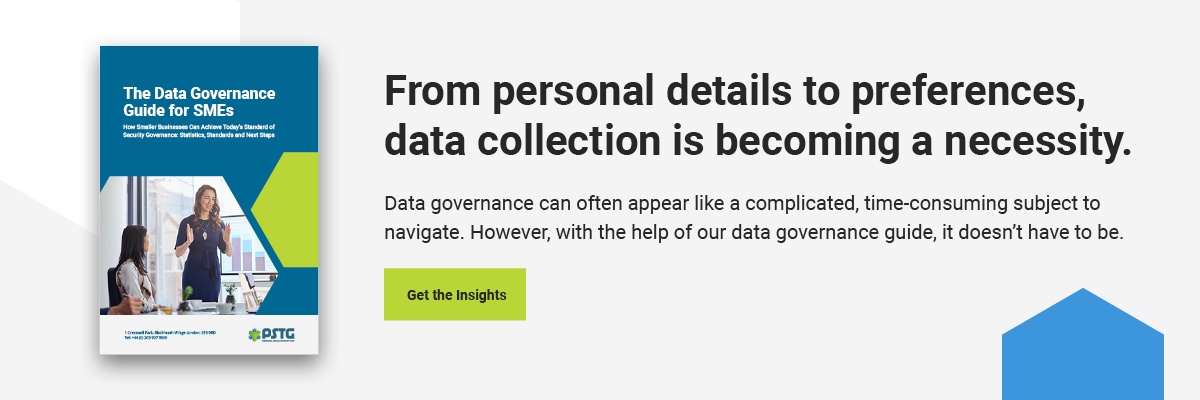What Is Data Governance? Security Explained Simply
.jpeg)
The global data governance market is expected to grow to $3.28billion in 2022, with a compound annual growth rate (CAGR) of 24.9%. It’s also predicted to grow at a CAGR of 22.7% until 2026, reaching a value of $7.42billion. As the significance companies and customers place on data grows, so does the importance of effectively utilising it.
There’s no doubt data is essential in modern business. But how should you effectively gather and utilise data? And which regulations should you be aware of when it comes to data? This comprehensive article will look at what data governance is, its place in modern business and its key benefits.
- What Is Data Governance?
- The Pillars and Principles of Data Governance.
- Why Data Governance Is Important and Applicable to All Business Types.
- The Undeniable Benefits of Data Governance.
What Is Data Governance?
Data governance comprises a collection of processes, roles and policies to determine whether the information is used effectively and efficiently for an organisation to achieve its goals. It’s everything you do to ensure your data is secure, private, accurate, available and usable.
Establishing your data governance processes and roles ensures data quality across a business or organisation. Data governance defines who can do what with data and which methods they should use.
Every organisation needs data governance. A good strategy will balance security with accessibility and be compliant with regulations. This will ensure your organisation’s data is protected and always where you need it most.
Effective data control across a company can lead to more efficient methods and behaviours surrounding data management. Data governance is different to information governance. Information governance refers to the secure handling of information at an organisational level. It covers processes such as record keeping, data protection and production.
Data governance refers to the oversight of all data, whereas information governance refers to data assets that have meaning to your business. In data governance, someone may perform their task with little understanding of the data’s meaning, whereas in information governance, meaning is essential.
Conducting information governance procedures is vital for organisations such as the NHS, which must ensure all information is:
- Stored safely and confidentially.
- Gathered fairly and effectively.
- Recorded accurately and reliably.
- Used effectively and ethically.
- Shared appropriately and lawfully.
Whereas information governance is mainly concerned with risk mitigation, data governance covers topics such as data quality and accessibility.
The Pillars and Principles of Data Governance
According to a report from Harvard Business Review, 87% of respondents said mastering how they manage data will be crucial for their organisation’s future success.
For organisations with data at the heart of their processes, crafting a good data governance framework is essential. A data governance framework provides a data management strategy focusing on data privacy, accessibility and security.
Some common areas data governance policies cover are:
- Data quality - Data is correct and consistent. This is vital in making informed business decisions.
- Data availability - Data is readily available and easy to digest for business areas that need it. Mastering this process will save you time and money.
- Data usability - Structuring, formatting and organising data for easy search and retrieval. This, again, will save time and money for your company.
- Data security - Ensuring the prevention of data loss or leakage and that data is classified according to sensitivity. Essential for maintaining trust with your customer base.
- Collaboration - Internal company attitude toward data can play a crucial role in your data initiatives.
- Technology - Data governance tools to execute your policy’s requirements.
Data Governance Frameworks
Your data governance framework will help you assign responsibilities and make decisions based on your data. Three data governance frameworks are:
- Command and control - This assigns employees as data stewards who take on data governance responsibilities.
- Traditional - This method designates a larger number of employees as data stewards voluntarily. Some employees are assigned as ‘critical data stewards’ with additional responsibilities.
- Non-invasive - This framework assigns people as data stewards based on existing work and relation to data. Anyone who creates or modifies data becomes a data steward for that data.
What Roles Are Involved in Data Governance?
Depending on your business’ size, many people can be responsible for data governance. Small to medium-sized companies with no full IT or analytics team should still appoint data stewards to handle data.
Data stewards are individual team members assigned to implement data governance policies and processes. Data stewardship is vital to your data governance strategy as stewards take ownership of the data and work with the organisation to set objectives.
Data governance roles typically consist of:
- Chief data officer (CDO) - A senior position overseeing the data governance process. The CDO position’s responsibilities include securing funding for the programme, hiring staff and leading the programme.
- Data governance manager - The data governance manager will lead the data governance team. The data governance manager will oversee the project if a company doesn’t have a CDO
- Data governance committee - This consists of business executives and relevant parties. The committee is in charge of creating policies enforced by either the CDO or the data governance manager.
- Data stewards - As previously mentioned, data stewards oversee data sets and ensure policies are correctly implemented. Data stewards are typically IT experts but can also hold knowledge in business.
Why Data Governance Is Important and Applicable to All Business Types
In the modern world, data is arguably the most important asset a business has. Data governance ensures your data is usable, accessible and secure. The organisation of data leads to better data analytics, which means you can make more informed decisions to help your business grow.
Poor data governance can also present risks. Outside security risks can pose a threat if your data is unstructured and there is regulatory compliance to adhere to. Poorly structured data makes monitoring which data may be at risk more difficult. Good data governance lets you quickly identify if something goes wrong and observe what is happening across your database.
Regulatory compliance is also becoming more scrutinised. As people’s knowledge of data grows, governments treat how companies store and protect customer data much more seriously.
Data Governance for SMEs
Even for SMEs, it’s essential to start thinking about data governance if you haven’t already. By ensuring you use your data effectively and efficiently, you can provide your employees with easily accessible information that can help guide business decisions.
Not only this, but data security is also a crucial concern for many modern companies.
A survey by McKinsey found that 87% of respondents wouldn’t do business with a company if they had concerns about its security practices. In addition, 71% said they would stop doing business with a company if it gave away sensitive data without permission.
But how do SMEs get started with data governance? Here are a few things to consider:
1. Data Compliance and Security
Data compliance is arguably the most crucial factor for small businesses to consider when it comes to data. Breaching data protection laws can lead to fines or legal ramifications. The most well-known data protection law is GDPR. A survey from REaD group found that 85% of SMEs are familiar with GDPR.
GDPR gives people more control over their personal information. If you haven’t implemented a GDPR compliance process into your data governance strategy, it’s time to do so.
Data security should also be high on your list of priorities when handling data. Companies have a responsibility to protect their customers’ data from data breaches. You can use simple data protection measures such as firewalls, two-factor authentication and antivirus software.
2. Data Backups
It’s also important to regularly back up your data. Data is vital for modern businesses, so losing it could greatly impact your processes. Back up your data to the cloud or servers and clean data backups to comply with data protection laws.
If a customer wishes for their information to be wiped from your system, it’s crucial to ensure that their details are removed from any backups.
3. Create New, Accessible Data
It can be difficult for small businesses to obtain new, valuable data. However, it’s key to ensure you’re acquiring new data, so your analytics remain accurate. You can use several channels to gain valuable customer data, such as:
- Surveys/interviews.
- Newsletter and blog subscriptions.
- Customer orders.
- Web tracking.
- Marketing analytics.
- Social media.
Collecting data allows you to understand your customers’ demographics, habits and preferences. This will enable you to make more informed business decisions to help you reach your goals.
The Undeniable Benefits of Data Governance
As well as ensuring you’re compliant with data protection laws, one key benefit of data governance is making data-driven decisions.
Data helps you understand your customers and the market your business is involved in. It can show you which products your customers enjoy, whether your marketing efforts are proving worthwhile or assist you in identifying a gap in the market.
So what are the main benefits of data governance?
1. Confidence in Your Decisions
Statistics don’t lie. By making decisions based on the data you collect and store, you’ll be more confident in the choices you make. Data will allow you to support business decisions, meaning strategic decisions become standard practice within your company.
You’ll become faster at reaching conclusions due to the support of data, meaning you’ll be more proactive and likely more profitable as a result. You’ll also be able to easily identify trends and use them to make better future decisions.
2. Compliance
It’s crucial to re-emphasise the importance of remaining compliant with data protection laws.
Adhering to an effective data governance framework will ensure you’re protecting your customers’ data and maintaining trust from your audience. Although you can’t measure profit from remaining compliant with data protection laws, avoiding the risk of fines or legal repercussions is a vital benefit of a good data governance strategy.
3. Save Time and Money
Implementing a data governance framework will save you both time and money. In fact, nearly 70% of respondents to Erwin’s 2020 State of Data Governance and Automation report said that they spend 10 or more hours per week on time-consuming data-related responsibilities.
Just imagine if that data was correctly organised and easily accessible. Not only will data governance allow you to make better-informed decisions, but you’ll also be able to reach those decisions more quickly.
The Data Governance Guide for SMEs
Achieving today’s data governance standard can be complex for small businesses. In this guide, we highlight the undesired outcomes of neglecting data governance and how SMEs can implement an effective data governance strategy.
To download your free copy, click below.




